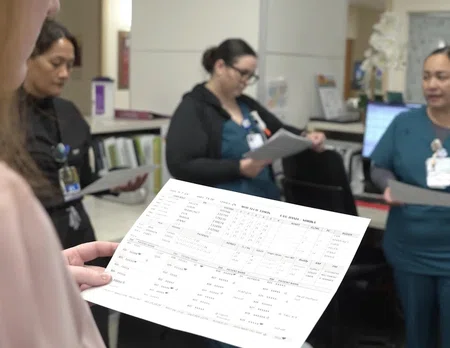© 2024. Houston Methodist, Houston, TX. All rights reserved.


In this
issue

WELCOME
NURSING SCIENCE

Elevator Pitch

Interventions to Improve Communication at Hospital Discharge and Rates of Readmission: A Systematic Review and Meta-Analysis
EDUCATION

Utilizing Technological Devices in Nursing Communication: Best Practices and Pitfalls

Intentional Conversations: Best Practice Strategies
PRACTICE

Engaging with Patients in Their Care Plan While Using the Narration of Care Principles

Innovations in Hand-off Report Communications
PROFESSIONAL DEVELOPMENT
MAGNET
FROM OUR TEAMS

ABOUT DISCOVERN
PRACTICE
Engaging with Patients in Their Care Plan While Using the Narration of Care Principles
By Lenis Sosa, DNP, RN, CCRC
By Lenis Sosa, DNP, RN, CCRC

Here at Houston Methodist, we adhere to the “narration of care principles" to engage with our patients and families to increase patient satisfaction. These principles emphasize personalized care and effective communication.
An excellent example of engaging with patients is asking them how they want to be addressed and using their preferred names. This simple step can help develop trust while personalizing care and putting the patient at the center of our care. Personalized care makes our patients feel valued and important.
While talking to patients, we must be calm and sincere and listen with our eyes and ears. We help remove uncertainty by explaining our procedures, environment and tasks. This not only reduces anxiety but also fosters trust. Since Houston is a diverse city, we must treat each patient on a case-by-case basis and learn about their culture and background to help us honor their diversity.
One aim of narrating care is to help us anticipate and address patients' needs as they arise. We do not assume patients know everything because of their professional backgrounds. We should take the time to explain the hospital environment and go over tasks and expectations during their hospitalization. This simple task can make a difference by comforting and easing anxiety in a stressful situation.
Effective communication is crucial in nursing. The better we communicate with our patients and families, the better the outcome. We need to know our patients and understand their culture, background, religion, and the best communication methods to communicate effectively. Body language is a significant way of communicating, and we sometimes do not realize how our gestures while speaking affect how our message is received. Making eye contact and acknowledging the recipient allows for a better connection and lets them know you are listening. Active listening, a crucial part of effective communication, is not just about hearing but truly understanding what the other person is saying. It's about being engaged and attentive, a skill that can be developed and honed. It plays a crucial role in understanding our patients' needs, making them feel heard and understood. Closing the loop while talking to others will reinforce what we are trying to say and give us time for explanation and clarification. Being present doesn't only mean being there next to the person; it ensures the recipient feels included in the conversation.
Effective communication with our patients, families, and colleagues goes beyond the basics. It's about making personal connections. This is what makes our care not just effective but also compassionate. By being calm, effectively listening, and asking patients about what is essential to them, their career, parents, pets, significant others, children, and preferred names to be called to reference later, we show that we care about them as individuals. This personal connection is a powerful tool in our communication arsenal, fostering a sense of connection and compassion. Please explain what you will do for the patient before performing the task and what they may feel, expect, and hear to remove any uncertainty. This is about informing and involving patients in their care and empowering them.
Narration of Care provides patients with effective communication throughout their hospital visit. It is easy to assume that our patients understand what we are saying or doing to them. However, explaining what will happen, expected complications or sensations and daily plans can make a difference in their stay. How do you plan to utilize narration of care in your practice?









